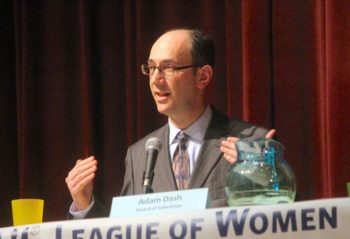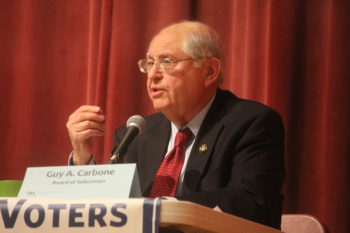Photo: Guy Carbone, candidate for Belmont Board of Selectmen.
My name is Guy Carbone. I ask you to vote for me for Selectman on April 4 and by doing so, make a real decision about Belmont’s future.
Belmont must balance its spending needs against the ability of its residents to pay for them. However, the actions of a small group of residents, whose desires and promises far exceed our ability to pay for them, may make it impossible for Belmont to meet spending needs in a fiscally and socially responsible manner. The result will be that even more of our neighbors and friends of all ages and lifestyles will leave Belmont because they can no longer afford to live here. That is something that must be stopped.
Belmont must deal with four large building projects that require solutions in the near-term. These projects should be prioritized and sequenced, so they do not unduly burden our residents whose property taxes and rents fund our schools as the public services the town provides. To do this, the Board of Selectmen needs a member with engineering and legal experience; I have three degrees in Civil Engineering from MIT, retired as a Colonel in the US Army Corps of Engineers and have a law degree from Suffolk Law School.
I bring broad experience to Belmont’s issues. As Commissioner of the Metropolitan District Commission (MDC), I led the cleanup of the Boston Harbor, Charles River, and downstream basins; as Belmont’s appointed representative to the MWRA, I represented our town for ten years. I was Chief Engineer of the Government Center Commission responsible for design and construction of the state buildings there.
I am not new to elected office: I was elected to four terms on Watertown’s School Committee and two terms as its Selectman before we moved to Belmont.
Why should you vote for me?
- I am a town government outsider whose executive and professional experience will bring fresh, educated solutions to Belmont’s issues.
- I will restore Belmont’s inclusivity and mutual respect.
- My experience directly relates to the capital projects ahead of us, including, but not limited to, a new high school, library, police station, and public works campus.
- You will benefit from my ideas on how to decrease Belmont’s reliance on fossil fuels and improve the impact we make on our environment.
- I will save our open spaces, increase the use of solar installations on appropriate municipal buildings, and encourage more use of electric vehicles, which will greatly reduce our carbon footprint.
- I support providing high-quality municipal services, as is maintaining and supporting best-in-class education that includes arts, athletics, and STEM.
- I have experience fostering commercial development, know how to preserve Belmont’s very special character and its diverse array of neighborhoods, and can thoughtfully diversify our tax base.
Belmont is a community where many are active in civic matters. It is this involvement that keeps all of you informed and represented at the town level. My wife and I both know this is having raised our son, Anthony, a very active athlete, in Belmont where we have lived for 30 years.
Most important, I listen to all of you, I hear all of you, and I promise to represent each and every one of you. Progress is best achieved as part of a balancing act between our fiscal responsibilities for our current town services and buildings with the desires of many for responsible Green initiatives. Working with my colleagues on the Board of Selectmen, I will balance Belmont’s expensive needs with your ability to pay for them.
Please cast your vote for me, Guy A Carbone, on Tuesday, April 4. To learn more, visit www.carboneforbelmont.org or my Facebook page.

